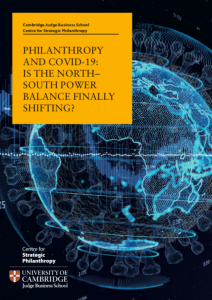Covid-19 is accelerating an already exist trend: the awakening of institutional philanthropy in the global south. Yet research released today from University of Cambridge’s Centre for Strategic Philanthropy at Judge Business School suggests this awakening is hampered by weak philanthropy infrastructure and networks, insufficient collaboration within and between sectors and a lack of core funding to build the resilience of the non-profit ecosystem.
 The research is published in the CSP’s first report titled ‘Philanthropy and COVID-19: Is the North-South Power Balance Finally Shifting’, and it looks at the pandemic as an opportunity to assess the current state of emerging market philanthropy, identify future opportunities and challenges, and inform and improve philanthropy’s impact.
The research is published in the CSP’s first report titled ‘Philanthropy and COVID-19: Is the North-South Power Balance Finally Shifting’, and it looks at the pandemic as an opportunity to assess the current state of emerging market philanthropy, identify future opportunities and challenges, and inform and improve philanthropy’s impact.
‘[T]he crisis has provided a real-time ‘natural experiment’ laboratory for assessing some of the challenges facing the philanthropic community. The insights drawn from the interviews and data in this report suggest that coronavirus – for all its temporal and lasting pain – is a crisis that the philanthropic world should and must draw lessons from,’ wrote CSP Academic Director Dr Kamal Munir and CSP Executive Director Clare Woodcraft in the reports foreword.
‘While many of the issues identified in the report are not new, the scale of the crisis highlights that society has little time to waste in extracting the most from the dedication and capital that philanthropists are willing to invest in solving some of the world’s most challenging problems. The pandemic could thus be a catalyst for positioning philanthropy to respond even more effectively to the next unpredictable but not unforeseeable crisis.’
The pandemic has served to lift the lid on different dynamics in philanthropy that had come to be taken for granted over the past several decades, said CSP which then asserted that one of the most affected areas of philanthropy this year has been the North-South relationship, which has long been characterised by an unequal power balance.
‘Our findings reveal a deep sense of dissatisfaction with the status quo. It is clear that the urgency and unexpectedness of COVID-19 has shaken up the existing mechanism for identification of programmes and fund disbursement. As public health came to attract the vast majority of resources in this period, old understandings of who should play what role in the North-South relationship have been seriously called into question,’ said CSP in its report.
Looking at the lessons learned from the pandemic, the report calls for three major steps for philanthropy to take in facing the challenges of the Global South and beyond:
- Fund networks to build infrastructure, capacity, and knowledge, which could significantly boost the development and institutionalisation of Global South philanthropy.
- Increase partnerships between Global South governments and Global South philanthropists. Such partnerships would increase the prevalence of South-South collaboration, which the report highlights as an important area of development.
- Build resilience by funding core costs – a welcome development in philanthropy this year has been the simpler, faster, and flexible funding available for grantees.
In the conclusion of its report, CSP writes: ‘The shift in the power dynamic that our research revealed is clearly nascent, fragile and patchy. However, it shows some early indications of practices that if nurtured and retained could potentially transform the relationship between Global North and Global South philanthropic actors. This in turn could lead to positive operational and policy outcomes that can help deliver more sustainable and scalable social impact.’
To explore the barriers to these steps and hear directly about some of the cutting-edge initiatives to overcome them, CSP’s directors Kamal Munir and Clare Woodcraft will join Alliance Executive Editor Charles Keidan for a webinar on 26 January. To sign up, email alliance@alliancemagazine.org.





Comments (0)